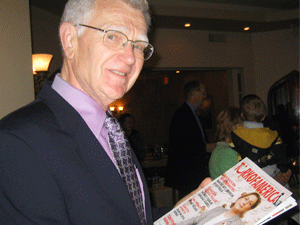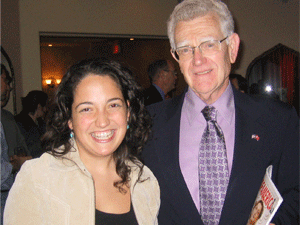The Turkish Heart Study
- Written by Ayse Onal Z.
- Published in Health
Ayşe Önal Zamboğlu- San Francisco
This email address is being protected from spambots. You need JavaScript enabled to view it.
Turkish American High-Tech Professionals welcomed a very special guest, Prof. Robert Mahley. Dr. Mahley is a renowned expert on heart disease, cholesterol metabolism and, more recently, Alzheimer's disease, and is the president of the J. David Gladstone Institutes, director of the Gladstone Institute of Cardiovascular Disease, and professor of pathology and medicine at the University of California, San Francisco (UCSF).
This email address is being protected from spambots. You need JavaScript enabled to view it.
Turkish American High-Tech Professionals welcomed a very special guest, Prof. Robert Mahley. Dr. Mahley is a renowned expert on heart disease, cholesterol metabolism and, more recently, Alzheimer's disease, and is the president of the J. David Gladstone Institutes, director of the Gladstone Institute of Cardiovascular Disease, and professor of pathology and medicine at the University of California, San Francisco (UCSF).
He was there to talk about the results of his extensive study, the Turkish Heart Study, which investigated the low levels of HDL-C (good cholesterol) in the Turkish population around the world and how that increases the risk factors for heart disease. I will try to summarize the valuable information he shared with us that night.

The first question that comes to mind is “Why did he choose to conduct a study particularly in Turkey?” He says he always wanted to perform an international study concerning the risk factors for cardiovascular disease. In 1987 with the support of the Gladstone Trustees he began looking for a population in which no thorough study of risk factors for heart disease had yet been done, and Turkey met all the criteria.
ISTANBUL VERSUS AYVALIK
The Turkish Heart Study began in 1990. Dr. Mahley set up his laboratory in the American Hospital in Turkey and he traveled to many villages in Anatolia with his wife to conduct the research. The main cities he mentioned when presenting his results were Istanbul, Adana, Trabzon, Kayseri, Aydin, and Ayvalik. The results were very impressive. Turks residing in Istanbul had the highest total cholesterol levels where Turks in Ayvalik had the lowest Diet is said to be the differentiating factor in these results. Olive oil, which is a monosaturated fat, is the main component of people’s diet in Ayvalik and diets rich in monosaturated fats instead of saturated fats like butter and margarine help us maintain a lower cholesterol level.
However, when the researchers analyzed the HDL-C levels in Turkish people, the geographical location of the subjects proved to be irrelevant. The HDL-C level was exactly the same for men living in Istanbul and in Ayvalik Turks had significantly lower HDL-C levels than many other ethnic populations no matter where they lived. These findings of the study revealed that the major risk factors for heart disease in Turks was different than in the U.S. and Western Europe; Turks had very low levels of HDL (good cholesterol), some of the lowest in the world. Dr. Mahley says that they have not yet been able to identify the cause of the low HDL levels, but it’s likely genetic according to the findings.
While we are waiting for further developments in the Turkish Heart Study, Dr. Mahley advised us that although it is important to maintain a low total cholesterol level, the real risk factor is determined by the ratio of the total cholesterol level to the HDL (good cholesterol) level. The ideal ratio is below 3.5, and a ratio above 4.5 is said to be a high risk for heart disease. For example, if you have a total cholesterol of 200, which is not very high, and your HDL is 30, your ratio is therefore 6.6, which is well above the high risk limit, but you would not be identified as being a high risk patient if only the total cholesterol level were looked at.
SUGGESTIONS
Here are the suggestions by Dr. Mahley for Turkish people to decrease their risk factors of developing heart disease by increasing their HDL (good cholesterol) levels.
- Get your cholesterol levels checked,
- Exercise and make changes in your diet,
- Try to maintain a healthy body weight
- Stop smoking.
Since it’s the ratio that is important, a 1 mg increase of the HDL levels decreases the risk of developing heart disease by 2-4%, which is quite significant.

GOOD FRIEND OF THE TURKS
At the end of his presentation Dr. Mahley pointed out that Turkey has excellent doctors and several high-quality medical schools, and is now in a better position to take the needed precautions to cope with the adverse health effects of the Western-style diet that is becoming increasingly popular in urban areas.
These were the main points discussed at the event; I have tried to share them with you without going into many scientific details.
There is one more thing I would like to add. Dr. Mahley’s interest in Turkey is not limited to scientific research; he is a good friend of the Turks worldwide, and loves Turkey so much that he spends three to four months a year at his house in Bebek, Istanbul with his wife Linda Mahley. That evening he was more of a host than a guest. He greeted the participants at the door and introduced himself. By the end of the night he had everybody admiring his sincerity and modesty. I would like to thank him once again for sharing his valuable knowledge with us.
If you would like to read more about the study, you can visit The Anatolian Journal of Cardiology at http://www.anakarder.com/yazilar.asp?yaziid=233&sayiid=8. If you would like more information on Gladstone Institutes: www.gladstone.ucsf.edu
(July 2005, 17th Issue)

Prof. Robert Mahley.
The first question that comes to mind is “Why did he choose to conduct a study particularly in Turkey?” He says he always wanted to perform an international study concerning the risk factors for cardiovascular disease. In 1987 with the support of the Gladstone Trustees he began looking for a population in which no thorough study of risk factors for heart disease had yet been done, and Turkey met all the criteria.
ISTANBUL VERSUS AYVALIK
The Turkish Heart Study began in 1990. Dr. Mahley set up his laboratory in the American Hospital in Turkey and he traveled to many villages in Anatolia with his wife to conduct the research. The main cities he mentioned when presenting his results were Istanbul, Adana, Trabzon, Kayseri, Aydin, and Ayvalik. The results were very impressive. Turks residing in Istanbul had the highest total cholesterol levels where Turks in Ayvalik had the lowest Diet is said to be the differentiating factor in these results. Olive oil, which is a monosaturated fat, is the main component of people’s diet in Ayvalik and diets rich in monosaturated fats instead of saturated fats like butter and margarine help us maintain a lower cholesterol level.
However, when the researchers analyzed the HDL-C levels in Turkish people, the geographical location of the subjects proved to be irrelevant. The HDL-C level was exactly the same for men living in Istanbul and in Ayvalik Turks had significantly lower HDL-C levels than many other ethnic populations no matter where they lived. These findings of the study revealed that the major risk factors for heart disease in Turks was different than in the U.S. and Western Europe; Turks had very low levels of HDL (good cholesterol), some of the lowest in the world. Dr. Mahley says that they have not yet been able to identify the cause of the low HDL levels, but it’s likely genetic according to the findings.
While we are waiting for further developments in the Turkish Heart Study, Dr. Mahley advised us that although it is important to maintain a low total cholesterol level, the real risk factor is determined by the ratio of the total cholesterol level to the HDL (good cholesterol) level. The ideal ratio is below 3.5, and a ratio above 4.5 is said to be a high risk for heart disease. For example, if you have a total cholesterol of 200, which is not very high, and your HDL is 30, your ratio is therefore 6.6, which is well above the high risk limit, but you would not be identified as being a high risk patient if only the total cholesterol level were looked at.
SUGGESTIONS
Here are the suggestions by Dr. Mahley for Turkish people to decrease their risk factors of developing heart disease by increasing their HDL (good cholesterol) levels.
- Get your cholesterol levels checked,
- Exercise and make changes in your diet,
- Try to maintain a healthy body weight
- Stop smoking.
Since it’s the ratio that is important, a 1 mg increase of the HDL levels decreases the risk of developing heart disease by 2-4%, which is quite significant.

Ayse Onal Zamboglu with Prof. Robert Mahley.
GOOD FRIEND OF THE TURKS
At the end of his presentation Dr. Mahley pointed out that Turkey has excellent doctors and several high-quality medical schools, and is now in a better position to take the needed precautions to cope with the adverse health effects of the Western-style diet that is becoming increasingly popular in urban areas.
These were the main points discussed at the event; I have tried to share them with you without going into many scientific details.
There is one more thing I would like to add. Dr. Mahley’s interest in Turkey is not limited to scientific research; he is a good friend of the Turks worldwide, and loves Turkey so much that he spends three to four months a year at his house in Bebek, Istanbul with his wife Linda Mahley. That evening he was more of a host than a guest. He greeted the participants at the door and introduced himself. By the end of the night he had everybody admiring his sincerity and modesty. I would like to thank him once again for sharing his valuable knowledge with us.
If you would like to read more about the study, you can visit The Anatolian Journal of Cardiology at http://www.anakarder.com/yazilar.asp?yaziid=233&sayiid=8. If you would like more information on Gladstone Institutes: www.gladstone.ucsf.edu
(July 2005, 17th Issue)
Last modified onSaturday, 06 May 2017 10:07
Tagged under
